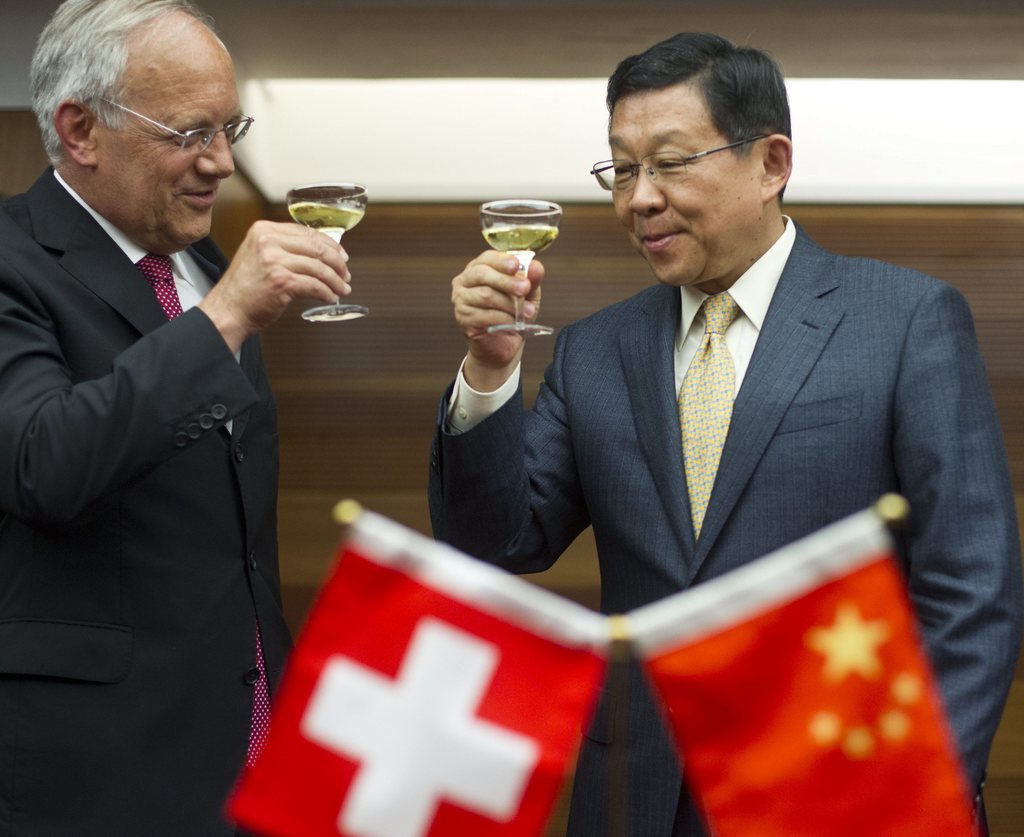Switzerland shapes accord with China

After a series of high-level talks in Beijing, Swiss Economics Minister Johann Schneider-Ammann says he hopes that Switzerland and China can sign a free trade agreement by the end of the year.
“There are still many problems and challenges, but I’m very confident that we can find a solution before the end of the year,” Schneider-Ammann said.
The economics minister’s entourage includes 25 captains of industry, a dozen officials and several journalists. In Beijing, the Swiss organised the Sino-Swiss Economic Forum, which brought together 300 Swiss and Chinese business people.
“The Swiss mission has a strong symbolic aspect, allowing us to get to get to know our partners better. It is crucial to develop a positive relationship,” said Stéphane Graber of the Swiss-Chinese Chamber of Commerce.
High hopes
“We expect benefits for our industry and financial sectors,” said Gerold Bührer about the prospects of a free trade agreement. Bührer, president of the Swiss business federation, economiesuisse, added that a bilateral accord better protecting Swiss investments and reducing tariffs would save jobs in Switzerland.
For Alexandre Jetzer, a consultant for pharmaceutical giant Novartis, the agreement would allow goods to be imported into China at zero duty. “Currently, the taxes we pay are a heavy burden, as is the red tape. We lose a lot of time, and Chinese patients pay the price for that.”
Geneva-based manufacturer LEM is very active in China. LEM president and CEO Gabella Francis said Switzerland had a “unique opportunity to strengthen its presence” in the country.
One example is the jeweller Gübelin. President Thomas Gübelin said a free trade agreement could lead the family-run business to establish itself in China. “There will be much greater security than there is now,” he said.
And Patrick Hofer-Noser, president of Cleantech Switzerland, said he believed an accord would make it easier to export Swiss expertise in sustainable technologies.
Fighting fakes
The watch industry is another core area for attention; according to the Federation of the Swiss Watch Industry (FH), 40 million fake watches are produced every year in the world – many of them in China. The turnover of Swiss watch counterfeiters amounts to about SFr1 billion ($1.02 billion).
“The conclusion of these negotiations would be quite profitable for us,” said Maurice Altermatt, head of the FH’s economic division. “We want better protection of brands and models. Collaboration with the Chinese authorities has borne fruit but when the whole country is taken into account, it’s necessary to renew efforts, especially to ensure they have a lasting impact and not just limited measures.”
Before any deal is signed, Schneider-Ammann said China wants Switzerland to further open its agricultural sector, while Switzerland wants better access to Chinese industry. “I expect the Chinese to reduce duties to a minimum, without exception. And we are also discussing intellectual property.”
Sustainability
The economics minister says the agriculture concessions Switzerland is prepared to make will be limited. “I do not want to anger our farmers. We are not willing to sacrifice our agricultural sector.”
Roland Decorvet, director of Nestlé in China, agreed that Swiss farmers should not fear cheap produce from the Asian country on Swiss supermarket shelves any time soon, since China imports more food than it exports. “The last thing they would export are essential goods that could compete with Swiss products.”
Sustainable development, labour and human rights in China were included in the talks Schneider-Ammann had with Chinese officials. “Switzerland will certainly not sign an agreement without provisions on sustainable development. Social and environmental issues will likely be addressed in two additional accords.”
Switzerland’s chief negotiator Christian Etter insisted that any free trade agreement would include an exception clause, providing for measures to prevent the entry of products into Switzerland from prisons or labour camps.
Switzerland recognised the newly established People’s Republic of China in January 1950, one of the first Western states to do so.
Bilateral relations between Switzerland and China have developed at a brisk pace since Deng Xiaoping launched his policy of liberalisation and reform in 1979.
Since 2002 China, including Hong Kong, has been Switzerland’s most important trade partner in Asia.
The trading volume reached a record SFr15.2 billion ($15.6 billion) last year – an increase of nearly 12% on 2010.
China is among the top three trading partners of Switzerland, behind the EU and the US.
(Adapted from French by Dale Bechtel)

In compliance with the JTI standards
More: SWI swissinfo.ch certified by the Journalism Trust Initiative












You can find an overview of ongoing debates with our journalists here . Please join us!
If you want to start a conversation about a topic raised in this article or want to report factual errors, email us at english@swissinfo.ch.